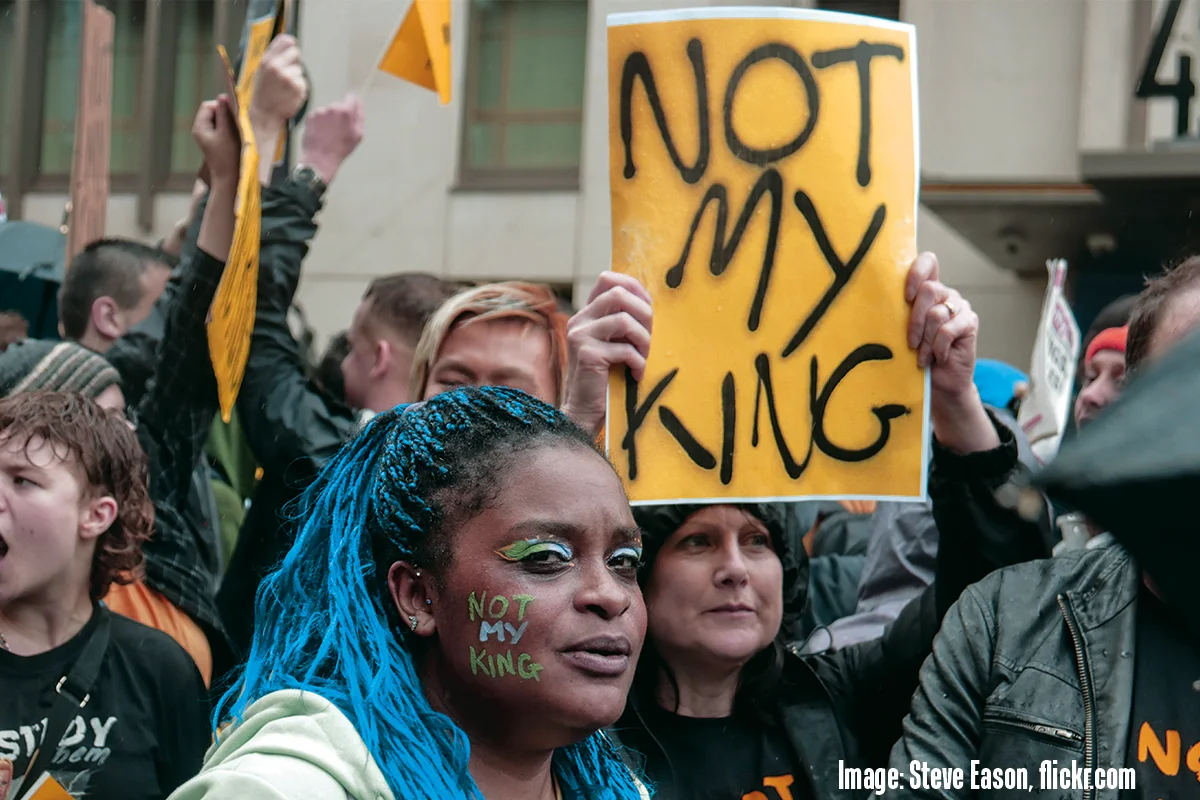The nauseating nationalism surrounding the coronation celebrations in Britain was accompanied by a swathe of anti-monarchy arrests. The ruling class are gearing up for the battles ahead. Workers and youth must fight back with militant class struggle.
The coronation of King Charles III and Queen Camilla took place last weekend, in case anyone didn’t notice.
But despite the establishment plastering this spectacle over television screens, social media, and electronic billboards across the country, for most people life went on as usual.
Damp squib
In fact, viewership of the coronation was much lower than expected, peaking at just under 19 million viewers on Saturday. To put that into perspective, this figure is 10 million less than the number who tuned in to watch the Euro 2020 finals.
In London itself, the route of the procession was merely a quarter of the length of the 1953 coronation, taking into account the reduced crowd sizes.
And photographs from empty, grey town centres across the country made for a sorry sight, revealing the widespread mood of apathy amongst ordinary people towards this latest circus.
Love u Britain 🇬🇧 pic.twitter.com/Sa91xcHm6R
— Sudden Beth (@bethdanger) May 6, 2023
Indeed, two thirds of the public said that they simply ‘don’t care’ about the coronation at all. Most were probably too distracted by trivial matters like ‘am I going to be able to afford my food shop this month?’ or ‘is my landlord going to hike my rent again?’
Not that anyone would have missed much, mind you. The coronation itself was an extremely dull affair, with the new King exuding all the regality of a scarecrow as he read his oaths from a prompt card. Even his own grandson, Prince Louis, was seen yawning throughout the ceremony.
How things have changed for the House of Windsor. Having enjoyed wide popularity during the reign of the late Queen Liz, the monarchy is now mired in crisis, and is suffering its lowest-ever public approval. The future looks bleak for the Crown.
Anti-monarchy arrests
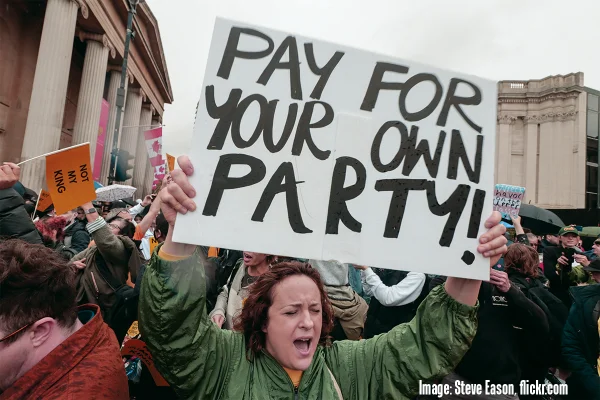 The Met Police clamped down on anti-monarchy protests in a particularly severe manner / Image: Steve Eason, Flickr
The Met Police clamped down on anti-monarchy protests in a particularly severe manner / Image: Steve Eason, Flickr
Much more notable than all this pomp and pageantry were the events taking place just a few hundred metres from Westminster Abbey, where the Met Police clamped down on anti-monarchy protests in a particularly severe manner.
As part of ‘Operation Golden Orb’, the police made 64 arrests, with all but a few of them relating to “concerns people were going to disrupt the [coronation]”.
A number of the arrests were made using legislation brought into force barely a week ago, as part of the Tories’ Public Order Act.
Police arrest anti-monarchy protestors ahead of King Charles’ Coronation.
— Times Radio (@TimesRadio) May 6, 2023
The leader of anti-monarchy group Republic and others holding 'not my King' banners are arrested as part of “a significant police operation”. #TimesRadio pic.twitter.com/UbrO0uV9DO
This is a bill that was explicitly designed to repress protests and direct action, in response to the rising tide of class struggle, and discontent over issues like the climate crisis.
On the grounds of this new legislation, protesters were handcuffed and detained for hours on the flimsy grounds of “suspicion of conspiracy to cause a public nuisance”.
Scandalously, six anti-monarchy activists were arrested simply for carrying placards and other items that might be used to cause disruption – including a piece of string!
Reportedly, one student, who was previously arrested and charged for throwing eggs at a royal procession in York, was detained after being flagged by new facial recognition software being deployed en masse over the weekend.
All of this seems more like what one would expect from a totalitarian dictatorship in a dystopian sci-fi novel, rather from those who profess to uphold ‘British values’ like liberty and democracy. As one human rights campaigner commented: “This is something you would expect to see in Moscow, not London.”
This reveals the reality of Britain’s rotten ruling class; the ugly face of the capitalist establishment.
Playing with fire
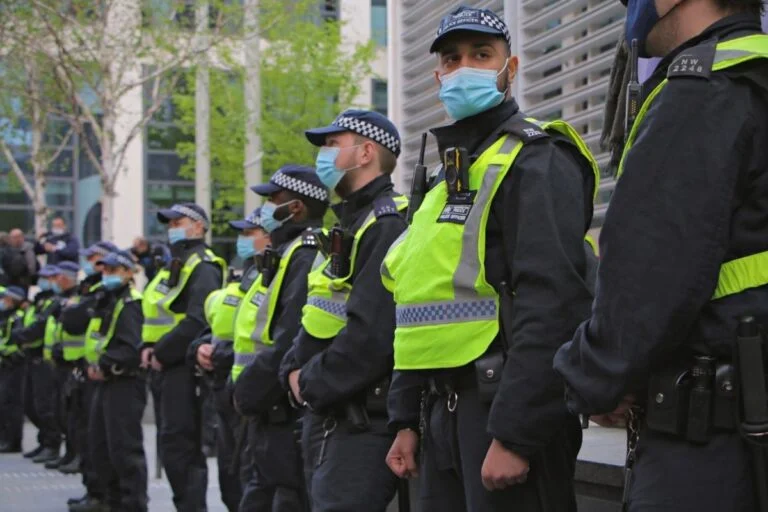 A number of protesters have been released without charge, and the Met has issued a number of (empty) apologies / Image: fair use
A number of protesters have been released without charge, and the Met has issued a number of (empty) apologies / Image: fair use
Since the arrests, a number of protesters have been released without charge, and the Met has issued a number of (empty) apologies.
In an official statement, police chiefs said that they “regret” a number of wrongful arrests – no doubt just as they ‘regret’ the rampant sexism, racism, and abuse which abound in their ranks.
The Met also claimed that they only aimed to arrest those who sought to disrupt the coronation, and had no intention of clamping down on all protests.
But if possession of a simple piece of string is enough to land republican activists in cuffs, then such words don’t provide any reassurance whatsoever.
This fiasco, and the Public Order Bill itself, has even drawn condemnation from those within the establishment, including figures such as Tory MP David Davis and ex-head of Manchester police Peter Fahy.
No doubt they can see that such heavy-handed tactics offer diminishing returns, and could even risk sparking a bigger backlash, all while further undermining confidence in the police.
By deploying the police so vigorously, in other words, the ruling class is playing with fire.
Law and order
In a remarkable display of ‘forensic’ analysis, Labour MP Lisa Nandy said that “clearly something [went] wrong” with Saturday’s policing, while maintaining that the police “deserve credit” for their work.
The shadow frontbencher also affirmed that Labour are not committed to repealing the Public Order Bill – another disgusting effort to outflank the Tories and underline Starmer’s message about Labour being the true ‘law and order party’.
Such rhetoric will not wash with workers and youth, however, who want policies to end the cost-of-living crisis, not fervent flag-waving and praise for the boys in blue.
Social explosion
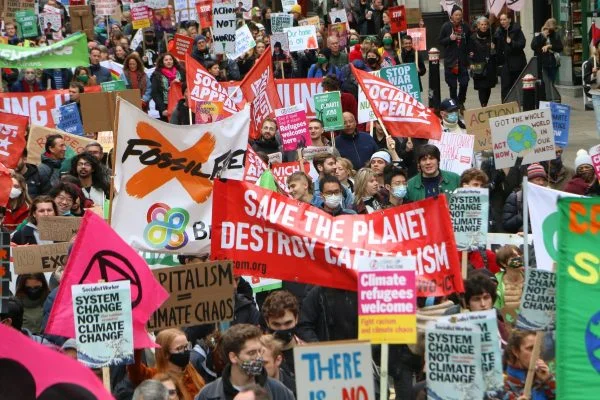 With class struggle and discontent on the rise, the ruling class are growing anxious / Image: Socialist Appeal
With class struggle and discontent on the rise, the ruling class are growing anxious / Image: Socialist Appeal
It would have been fairly easy for the Met to allow this 2000-strong protest to go ahead as normal, without drawing attention to it.
As one campaigner commented, the police had been in discussion with the organisers of the demonstration for months, and hadn’t raised any concerns.
So why did this clampdown happen?
With class struggle and discontent on the rise, the ruling class are growing anxious, and are increasingly looking to beef up the powers of the state in advance of the social explosions that impend.
From the Public Order Act to the Police, Crime, Sentencing, and Court Bill, the bosses are gearing up for a turbulent period of bitter class war.
Saturday’s clampdown was therefore quite clearly a deliberate provocation; an attempt to demonstrate to activists – and the wider labour movement – that the capitalist state can and will resort to repression if necessary, in order to defend the interests of the British establishment.
Class struggle
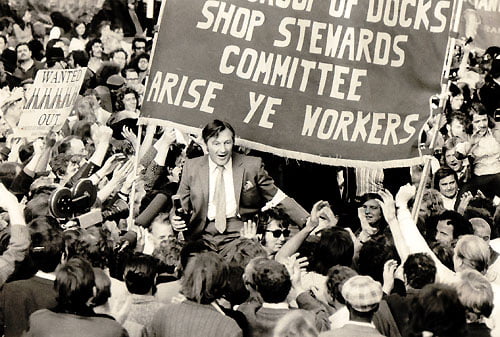 In 1972 a group of trade unionists known as the ‘Pentonville Five’ were arbitrarily arrested and charged for ‘unlawful’ picketing / Image: public domain
In 1972 a group of trade unionists known as the ‘Pentonville Five’ were arbitrarily arrested and charged for ‘unlawful’ picketing / Image: public domain
But such methods can easily backfire, as more farsighted sections of the ruling class are no doubt aware.
In 1972, for example, a group of trade unionists known as the ‘Pentonville Five’ were arbitrarily arrested and charged for ‘unlawful’ picketing. This attack provoked militant action by the working class, including the threat of general strike. This forced the Tories to retreat, and revealed the weakness of the government.
This latest clampdown is a warning to the labour movement of what to expect in the battles ahead. But as the experience of the Pentonville Five shows, there is no force on earth more powerful than the working class, when mobilised and organised.
To combat state repression and defend our political rights, we need militant class struggle.

